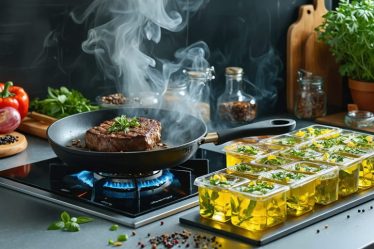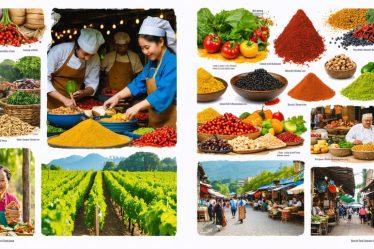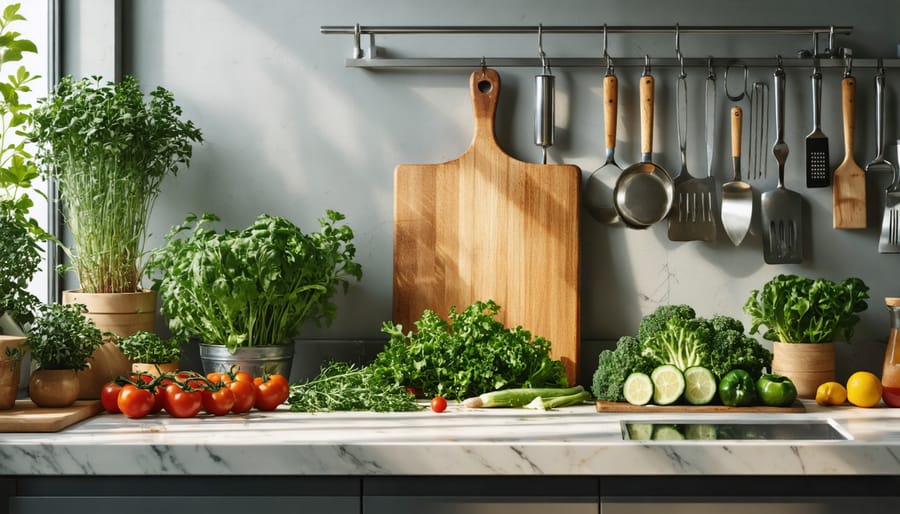
Transform your kitchen into a sanctuary of intention by embracing mindful eating practices and conscious cooking rituals. Picture the gentle sizzle of fresh vegetables hitting a well-seasoned pan, the earthy aroma of herbs carefully selected from your windowsill garden, and the rhythmic motion of your knife as it glides through locally sourced produce. This is more than meal preparation—it’s a daily meditation that nourishes both body and soul.
The conscious cook understands that every kitchen decision ripples outward, affecting personal health, community wellbeing, and environmental sustainability. Whether choosing seasonal ingredients from local farmers’ markets, reducing food waste through creative repurposing, or taking moments to appreciate the cultural heritage behind beloved recipes, conscious cooking invites us to forge a deeper connection with our food journey.
In today’s fast-paced world, where meals often become an afterthought, conscious cooking offers a return to presence, purpose, and pleasure. It’s about creating space for mindful moments in our daily routines, transforming ordinary meals into extraordinary experiences that feed not just our bodies, but our spirits.
What Makes a Cook ‘Conscious’?
Mindfulness in the Kitchen
Picture this: You’re in your kitchen, and instead of rushing through dinner prep while scrolling through your phone, you’re fully present – feeling the weight of the knife in your hand, inhaling the fresh aroma of herbs, and listening to the gentle sizzle of vegetables hitting the pan. This is mindfulness in the kitchen, and it’s transformative.
Mindful cooking isn’t just about the end result; it’s about finding joy in the journey. When we slow down and engage all our senses, cooking becomes less of a chore and more of a meditation. Start by taking three deep breaths before you begin cooking. Notice the colors, textures, and smells of your ingredients. Feel the coolness of fresh produce or the warmth of freshly baked bread.
As you chop, stir, and season, stay connected to each movement. If your mind wanders (and it will!), gently bring your attention back to the task at hand. This practice not only makes cooking more enjoyable but often results in better-prepared meals because you’re more attuned to timing, temperature, and seasoning.
Remember, mindful cooking isn’t about perfection – it’s about presence. Even five minutes of focused attention while preparing a simple meal can bring more peace to your day.
Sustainable Cooking Practices
Creating a more sustainable kitchen doesn’t have to be overwhelming. As a conscious cook, incorporating sustainable kitchen practices into your daily routine can make a significant impact on both the environment and your cooking experience.
Start by embracing seasonal, local ingredients to reduce food miles and support your community. I love visiting my local farmers’ market on weekends – it’s amazing how much fresher everything tastes! Plan your meals thoughtfully to minimize food waste, and get creative with leftovers by transforming them into new dishes.
Energy-efficient cooking methods can make a big difference too. Try batch cooking when possible, using lids on pots to reduce cooking time, and matching pot sizes to burner sizes. I’ve found that using a pressure cooker not only saves energy but also preserves more nutrients in my food.
Consider composting kitchen scraps and using eco-friendly cleaning products. Small changes, like switching to reusable produce bags and storing food in glass containers instead of plastic, can collectively create a more sustainable kitchen environment. Remember, every mindful choice counts!
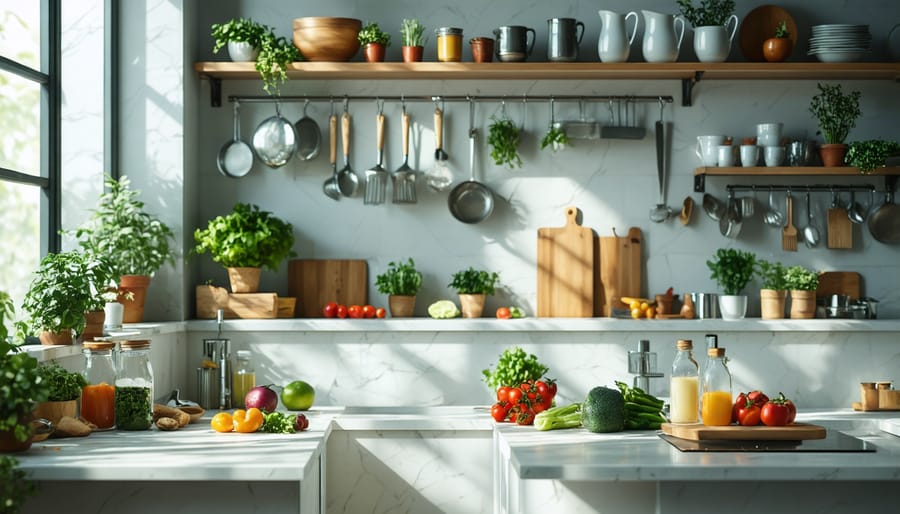
Creating Your Mindful Kitchen Space
Essential Tools and Equipment
A well-equipped kitchen is the foundation of mindful cooking, and choosing the right tools can transform your culinary experience. I’ve found that having a thoughtful collection of eco-friendly kitchen tools not only enhances my cooking practice but also helps me stay connected to my environmental values.
Start with a high-quality chef’s knife – it’s truly the heart of conscious food preparation. I recommend investing in a wooden cutting board that’s both beautiful and sustainable. A set of glass storage containers helps reduce plastic waste while keeping ingredients fresh and visible.
For mindful meal prep, consider essential tools like a reliable kitchen scale for precise portions, a set of sturdy mixing bowls (preferably stainless steel or glass), and measuring cups made from durable materials. A cast-iron skillet is another must-have; it’s virtually indestructible and improves with age, making it a sustainable choice that connects us to generations of cooking wisdom.
Don’t forget about smaller tools that make a big difference: a microplane grater for adding fresh zest, silicon spatulas for waste-free mixing, and a selection of wooden spoons that feel wonderful in your hands. Remember, conscious cooking isn’t about having every gadget available – it’s about choosing quality tools that bring joy to your cooking practice and align with your values.
Organization for Peace of Mind
A calm, organized kitchen is the foundation of mindful cooking. I learned this lesson the hard way after countless evenings of frantically searching for ingredients while trying to prepare dinner. Now, I follow a simple system that transforms cooking from chaos to meditation.
Start by creating intuitive zones in your kitchen. Keep frequently used items at arm’s reach and organize ingredients by category. I designate specific areas for breakfast items, baking supplies, and dinner essentials. This simple change eliminates the mental clutter that comes with searching for things mid-recipe.
Consider implementing the “mise en place” philosophy – having everything in its place before you begin cooking. Set up a prep station with all necessary ingredients and tools before turning on the stove. This practice not only reduces stress but also allows you to be fully present in the cooking process.
Clear countertops are crucial for a peaceful cooking environment. Store appliances you don’t use daily and maintain a dedicated space for food preparation. I keep a small basket for collecting items that don’t belong in the kitchen, preventing clutter accumulation.
Label containers and organize your pantry with clear storage solutions. This visibility helps you stay mindful of what you have, reducing food waste and unnecessary purchases. Remember, organization isn’t about perfection – it’s about creating a space that supports your cooking journey and brings you joy.
Mindful Ingredient Selection
Seasonal and Local Sourcing
One of the most impactful ways to become a conscious cook is embracing seasonal and local ingredients. Not only does this approach support sustainable food choices, but it also connects us more deeply with our local community and the natural rhythms of food production.
I discovered the joy of seasonal cooking when I first visited my local farmers’ market. The vibrant colors of summer tomatoes and the earthy sweetness of fall squash taught me that ingredients truly shine when enjoyed in their natural season. Plus, seasonal produce often costs less and travels shorter distances, reducing both our grocery bills and environmental impact.
Start by familiarizing yourself with your region’s growing seasons. Create a simple calendar marking when different fruits and vegetables are typically available in your area. Build relationships with local farmers and producers – they’re often happy to share cooking tips and alert you when your favorite ingredients are coming into season.
Consider joining a CSA (Community Supported Agriculture) program or shopping at farmers’ markets. These options not only provide the freshest ingredients but also help you discover new varieties and expand your cooking repertoire. Remember, cooking seasonally doesn’t mean limiting yourself – it’s about celebrating the abundance each season brings to your kitchen.
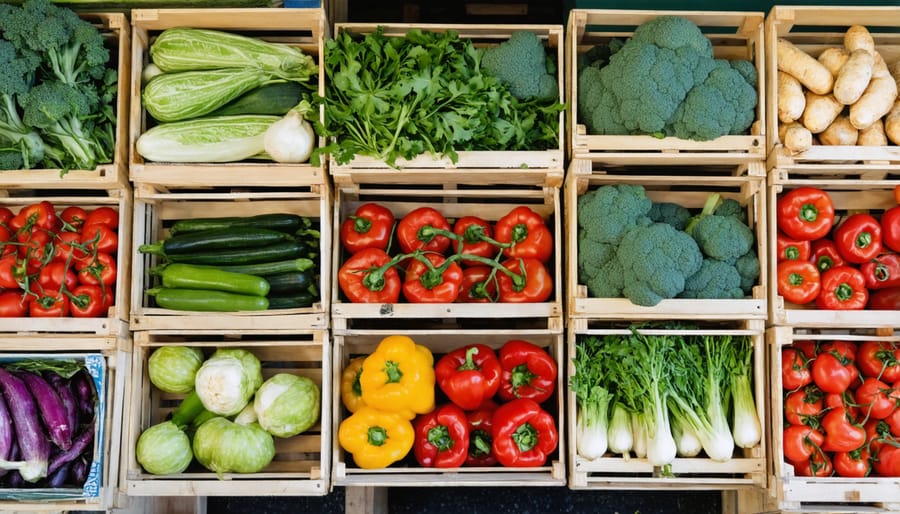
Understanding Food Origins
Understanding where your food comes from is like knowing the story behind a cherished family recipe – it adds depth and meaning to every meal you prepare. As a conscious cook, I’ve discovered that connecting with food sources transforms ordinary meal preparation into a mindful journey of discovery and appreciation.
Start by exploring your local farmers’ markets, where you can chat directly with the people who grow your food. It’s amazing how a simple conversation about seasonal vegetables can spark creativity in your kitchen and foster a deeper connection to your community. I remember the first time I bought heirloom tomatoes from a local farmer – her passion for sustainable growing practices completely changed how I approach my cooking.
Consider joining a CSA (Community Supported Agriculture) program or starting a small herb garden. Even growing a few basic herbs on your windowsill can help you understand the care and time that goes into food production. Pay attention to food labels, research farming practices, and learn about seasonal availability in your region.
When you know the journey your ingredients have taken to reach your kitchen, you’re more likely to use them thoughtfully and waste less. This awareness naturally leads to more sustainable choices and often results in fresher, more flavorful meals.
The Art of Slow Cooking
In our fast-paced world, there’s something almost magical about slowing down in the kitchen. When I first embraced slow cooking, it felt like discovering a secret pathway to both better-tasting food and a more peaceful mind. It’s not just about throwing ingredients in a pot and waiting; it’s about creating space for mindfulness in our daily routines.
Slow cooking transforms even the humblest ingredients into something extraordinary. Tough cuts of meat become tender and succulent, vegetables develop deep, complex flavors, and herbs infuse every bite with their essence. But beyond the culinary benefits, this approach to cooking offers something equally valuable: presence.
The beauty of slow cooking lies in its forgiving nature. Unlike high-heat methods that demand split-second timing, slow cooking allows you to work at a relaxed pace. Start by choosing one weekend recipe that takes a few hours. Perhaps a hearty stew or a slowly simmered sauce. As you chop vegetables, notice their colors and textures. When you stir the pot, observe how the aromas develop and change over time.
This mindful approach extends beyond traditional slow-cooker recipes. Consider the meditative quality of kneading bread dough, the patience required for perfectly caramelized onions, or the gentle process of making your own stock. These techniques not only yield better results but also create opportunities for reflection and connection with our food.
Time management might seem challenging, but slow cooking actually offers remarkable flexibility. Many dishes can be prepared in stages, and the hands-on time is often minimal. Set up your ingredients in the morning, let them simmer while you go about your day, and return to a kitchen filled with mouthwatering aromas.
Remember, slow cooking isn’t about complexity – it’s about allowing time and temperature to work their magic while you move at a more conscious pace. Start small, perhaps with one slow-cooked meal per week, and watch how this gentle approach transforms both your cooking and your relationship with food.
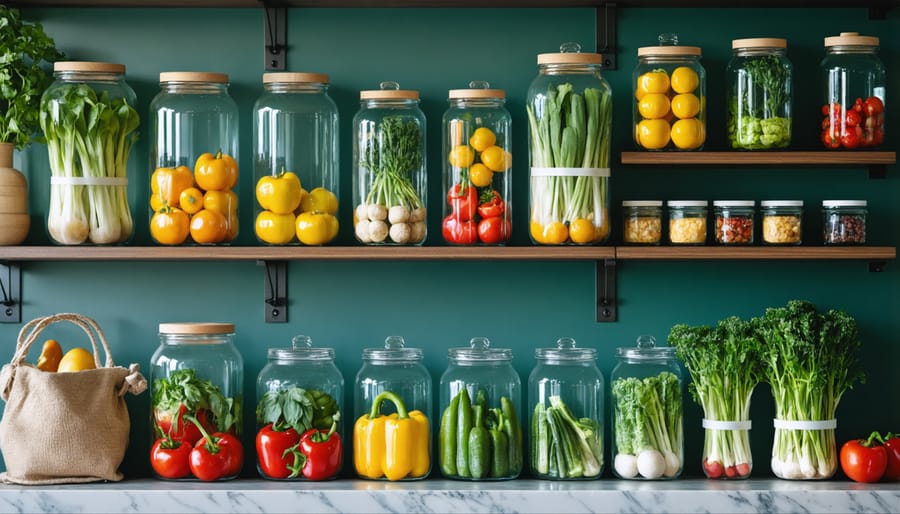
Reducing Kitchen Waste
Like many of you, I used to feel guilty every time I cleared out my fridge, finding wilted herbs and forgotten leftovers. That’s when I realized that becoming a conscious cook isn’t just about what we put into our meals – it’s also about what we keep out of the waste bin.
Start by conducting a weekly fridge audit before your grocery run. Take stock of what you have and plan meals around ingredients that need to be used first. Those slightly soft vegetables? Perfect for a warming soup or stir-fry. Brown bananas make the most delicious bread or smoothies.
Storage is your secret weapon in the battle against food waste. Invest in clear containers so you can see what’s inside, and label everything with dates. Store herbs like fresh flowers in water with a loose plastic bag over the top – they’ll last twice as long. Keep your bread in the freezer and toast slices as needed, rather than watching a whole loaf go moldy.
Get creative with scraps! Vegetable peels and ends can become flavorful stock, citrus peels can be candied or zested, and herb stems add depth to soups. Even coffee grounds can find new life as garden fertilizer or natural scrub. For more tips on how to store specific ingredients like coffee, you might enjoy exploring how to store coffee beans properly for maximum flavor.
Remember, portion planning is crucial. When cooking, think realistically about how much your household will eat. If you’re trying a new recipe, start with a half portion until you know if it’ll be a family favorite.
By implementing these simple strategies, you’ll not only reduce your environmental impact but also stretch your grocery budget further. The most sustainable meal is the one where every ingredient serves its purpose.
Embarking on your conscious cooking journey is more than just following recipes or buying organic ingredients – it’s about fostering a deeper connection with your food, your health, and our planet. As we’ve explored throughout this article, conscious cooking encompasses mindful ingredient selection, sustainable kitchen practices, and intentional food preparation that nourishes both body and soul.
Remember, every small step counts. Whether you start by sourcing local ingredients, reducing food waste, or simply taking a moment to appreciate the process of preparing your meals, you’re contributing to a more sustainable and mindful approach to cooking. The beauty of conscious cooking lies in its flexibility – you can adapt these principles to fit your lifestyle, budget, and personal values.
Don’t feel pressured to transform your kitchen overnight. Begin with what feels manageable – perhaps dedicating one day a week to mindful meal preparation or gradually replacing processed ingredients with whole foods. As your confidence grows, you’ll naturally find yourself making more conscious choices in your culinary adventures.
The rewards of conscious cooking extend far beyond the dining table. You’ll likely notice improvements in your health, a stronger connection to your food sources, and a sense of satisfaction knowing you’re contributing to a more sustainable future. Most importantly, you’ll discover the joy of creating meals that are not just delicious but also aligned with your values.
Let your conscious cooking journey begin today – your future self will thank you for taking this meaningful step toward a more mindful and sustainable lifestyle.


